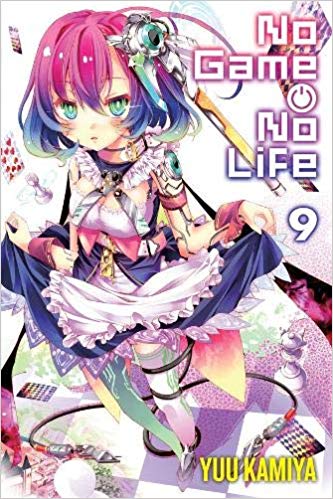By Yuu Kamiya. Released in Japan by MF Bunko J. Released in North America by Yen On. Translated by Daniel Komen.
This is, despite a few minor issues I had, a strong return to form for No Game No Life, which remembers what its main goal is besides being perverse, writing awkward prose, and occasional outbursts of plot: making the reader laugh. This is a funny volume, particularly if you enjoy seeing Sora suffer. While we do see [ ] in action towards the end, for the most part this is the Ex Machina, another of the Sixteen races and the ones who supposedly killed a God, trying to seduce Sora and get him to make babies with them. As you can see, this ridiculous premise hits on a lot of things that you know will be funny even without reading it: the war between Sora’s desire for sex, his fear of it, and his gamer brain trying to work out the actual plot behind it; the others’ over the top reactions to this, and the Ex Machina’s ludicrous attempts at seducing Sora, which run the gamut from offensive (the class of elementary schoolgirls) to actually well thought-out. Does Sora lose his virginity? Take a guess.
There is also the subplot which becomes far more important as the book progresses, which is Sora and Shiro closing the castle and devoting all their attention to becoming idol producers, with Holou as the idol in question. She’s still searching for answers, which means she compares nicely to Ex Machina, who are doing the same via this scheme. They declare that Sora is their “Spieler”, which is to say Riku from Book 6. But we already know that Sora isn’t, and deep down Ex Machina know that as well. Therefore what we end up with is “we want a purpose in life”, as well as how someone defines who they are. As robots, Ex Machina are not particularly unemotional, despite speaking in a very robot sort of way. Only two of them have actual roles, but they make them count.
Einzig is the “comedy gay” option among the otherwise female robots, and I like to imagine him looking like Koizumi from Haruhi, as he’s trying to do the same thing. Normally I might carp at this portrayal, but Sora’s “noooooooooooo!!!” is clearly meant to be mocked mercilessly rather than sympathized with. And then there’s Emir-Einz, named by Sora in a casual “your name’s too long to say” way that actually proves to be one of the more pivotal sentences in the book (also, props to him for remembering her full name anyway later). As with Einzig, she becomes a “type” – the obsessed stalker girl – but again, this is worth it because it’s funny seeing Sora in a state of constant panic. And Jibril, for that matter, who does not have her best book trying to help Sora escape these Droopy Dog robots. Steph is also mocked and embarrassed, but that’s par for the course, and she had a high point last volume anyway.
Assuming you enjoy the series, and can put up with what is still not the best translation in the world, this is a very good volume to pick up. The things I could object to are not things anyone reading this series to begin with would care about. Feel free to have fun with it.

